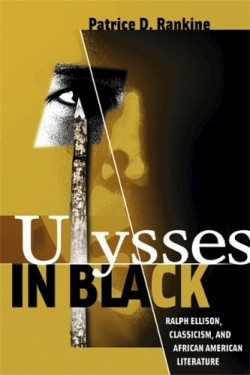Ulysses in Black
Ralph Ellison Classicism and African American Literature
“Race,” writes the author, “complicates the issue of classical reception more than any other ideological prism, including class, nationalism, or gender and sexuality.” This book explores the relationship between a few African American writers, primarily Ralph Ellison, and the classics that influenced their works. But Rankine is not concerned with simply explicating classical allusions. Rather, he argues that the classics “resonate on a different frequency in the hands of a black writer concerned with his or her personal and cultural integrity.”
In the wake of the Black Arts Movement in the 1960s, writers such as Ellison who expressed admiration for the classics were often accused by younger African Americans of supporting a Eurocentrism that had overtly racist implications. The fact that Invisible Man had won the National Book Award following its publication was further proof of Ellison’s literary and political conservatism.
Through an exploration of Invisible Man and the posthumous Juneteenth, Rankine argues that Ellison’s classicism “performed just the opposite function of what his critics claim.” He begins with an examination of classical literature to demonstrate their multivalence and adaptability, and how these characteristics might appeal to African American writers. He finds a body of literature “at times concerned with the critique of power”; central to this critique is the heroic figure of Ulysses, who is “as much the voice of the oppressed as he is the oppressor.”
The trope of the “Black Ulysses,” Rankine demonstrates, occurs repeatedly throughout Ellison’s writing, from the nameless hero of Invisible Man to Bliss in Juneteenth. The classics become a framework by which readers can understand the universality of the quests for identity of the black characters and the unique challenges those characters face because of their race. In addition, the classical tropes provide maps of action for the characters as they negotiate their own modern-day battles with Cyclops.
A secondary theme running throughout Ulysses in Black is the role that race plays in Classical Studies. Rankine is African American and an associate professor of classics at Purdue University. As such, he has faced professional and personal pressures from both those who feel that an African American scholar should not devote himself to Classical Studies and from those who feel that the study of race should play little or no role in the field.
On the final page, Rankine admits that the “aim of this book was to bring the relationship between the classics and black thought (particularly black literature) out in the open, as it were, to shift the nature of a conversation that was already taking place between the Classical Studies and Black Studies—to violently reconstitute our critical language.” In the end, to borrow a phrase from Ellison, he has sought to “change the joke and slip the yoke.” And with Ulysses in Black he may have just pulled it off.
Disclosure: This article is not an endorsement, but a review. The publisher of this book provided free copies of the book to have their book reviewed by a professional reviewer. No fee was paid by the publisher for this review. Foreword Reviews only recommends books that we love. Foreword Magazine, Inc. is disclosing this in accordance with the Federal Trade Commission’s 16 CFR, Part 255.

